|
|
|
Sort Order |
|
|
|
Items / Page
|
|
|
|
|
|
|
| Srl | Item |
| 1 |
ID:
114437
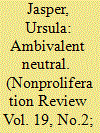

|
|
|
|
|
| Publication |
2012.
|
| Summary/Abstract |
Traditional analyses of Switzerland's nuclear weapons program often explain both its beginning and its end by merely subsuming it under the broad logic of security calculations: the country originally developed an interest in nuclear weapons due to its precarious security environment after the end of World War II; it ended its nuclear ambitions roughly two decades later when it felt less threatened by external powers. Yet this depiction of the Swiss case brushes aside the historical political context in which Switzerland's nuclear decision-making was embedded. Drawing upon studies in sociology and political theory, this article argues that understanding the Swiss debate on nuclear weapons is possible only if we manage to comprehend the significant political and cultural changes that took place within Swiss society. These changes deeply affected the country's defense and foreign policy conceptions and also altered prevalent notions of neutrality, thereby ultimately foreclosing the nuclear option. In more abstract theoretical terms the article moreover suggests that we need to overcome depictions of objectively given threats or predetermined interests and develop analytical tools that help us disentangle the complex, non-linear ways in which threat perceptions, identities, and preferences evolve and shape states' proliferation policies.
|
|
|
|
|
|
|
|
|
|
|
|
|
|
|
|
| 2 |
ID:
027473
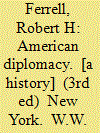

|
|
|
|
|
| Edition |
3rd ed
|
| Publication |
New York, W.W. Norton and Company, 1975.
|
| Description |
xiv, 881p.
|
|
|
|
|
|
|
|
|
|
|
|
Copies: C:1/I:0,R:0,Q:0
Circulation
| Accession# | Call# | Current Location | Status | Policy | Location |
| 026548 | 327.20973/FER 026548 | Main | On Shelf | General | |
|
|
|
|
| 3 |
ID:
173298
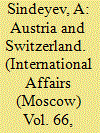

|
|
|
|
|
| Summary/Abstract |
THE WORLD ORDER is undergoing yet another transformation, and one whose result is hard to foresee.1 Europe is getting ready to get involved in rivalries among options for globalization, and this means it is again important for scholars to take up something that until recently was in danger of becoming a peripheral area of research - holistic studies of individual countries, including analysis of behavior models of smaller states and their desire and resources for relationships with larger actors.
|
|
|
|
|
|
|
|
|
|
|
|
|
|
|
|
| 4 |
ID:
171178
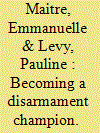

|
|
|
|
|
| Summary/Abstract |
The making of the Treaty on the Prohibition of Nuclear Weapons (TPNW) has put Austria and its involvement in nuclear disarmament in the spotlight. This study highlights several factors that led Austria to become a prominent voice in nuclear-disarmament debates. First, its involvement dovetails with the emphasis on humanitarian disarmament it has promoted since the 1990s. Second, a strong antinuclear identity pervades Austrian society. This “nuclear allergy” combines antimilitarism inherited from the Cold War and, more broadly, an aversion to nuclear power, including for energy purposes. These two considerations form the background to the increased activism of the Austrian Foreign Ministry on nuclear disarmament in international fora. But, equally, Austria’s crusade for the TPNW can be attributed to the engagement of a small team of diplomats implementing personal as well as national preferences in favor of disarmament.
|
|
|
|
|
|
|
|
|
|
|
|
|
|
|
|
| 5 |
ID:
080874
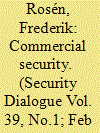

|
|
|
|
|
| Publication |
2008.
|
| Summary/Abstract |
Today, in what has been described as a re-emergence of privately organized extraterritorial force, the private military and security industry supplies the major military powers with a range of core services. This article asks how such a development came about, and why it has become politically uncomplicated to outsource such intimate state functions as the executive branches of foreign policy programmes. How did certain states arrive at a situation where it is unclear whether core military and security affairs are run by public or private agencies? The article answers these questions by presenting and commenting on general explanations as to why the private military industry has grown so much in post-invasion Iraq. It adds new perspectives to existing scholarly work by suggesting that the reappearance of private extraterritorial force could not have occurred on such a scale without a restructuring of neutrality in international relations. It is suggested that this change in neutrality might constitute the sine qua non of the re-emergence of private extraterritorial force.
|
|
|
|
|
|
|
|
|
|
|
|
|
|
|
|
| 6 |
ID:
141057
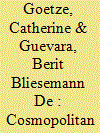

|
|
|
|
|
| Summary/Abstract |
Cosmopolitanism has been argued to be a crucial component of peacebuilding, both with regard to its aims as well as its staff. In a universalist-liberal understanding of the concept, cosmopolitanism is the optimal mind frame for peacebuilders to rebuild post-war societies, due to the tolerance, justice-orientation, and neutrality regarding local cleavages that the concept entails in theory. This article argues, however, that cosmopolitanism cannot be understood outside of its social context, therefore requiring sociological empirical analyses. Drawing on three such sociological concepts, namely elite, glocal, and localisable cosmopolitanism, the article analyses empirically through interviews with peacebuilders in Kosovo whether and in which form these international civil servants display cosmopolitan worldviews. The study concludes that while in theory the localisable variant would be best suited to contribute to locally sensitive, emancipatory peacebuilding, this form of cosmopolitanism is absent in practice. Given the novel, exploratory character of this analysis of hitherto uncharted terrain, the article also discusses in detail how the findings were obtained and in how far they are generalisable.
|
|
|
|
|
|
|
|
|
|
|
|
|
|
|
|
| 7 |
ID:
096357
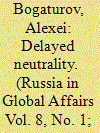

|
|
|
| 8 |
ID:
091726
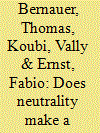

|
|
|
| 9 |
ID:
187346
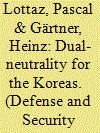

|
|
|
|
|
| Summary/Abstract |
This article builds a novel argument for the unification of the two Korean states by way of a dual neutralisation process. After reviewing the neutralisation concept and the history of neutrality ideas for the peninsula, the authors introduce two historical models that would fit the security needs of both Koreas and their respective security partners. Using a realist framework, it is argued that the “Finlandisation” of the DPRK on the one hand; and the “Austriasation” of the ROK on the other, would not change the de facto security relationships with their patrons, but would create the structural underpinning for future foreign policy compatibility. Assuming other factors remain equal and a solution to internal political division could be brokered, the article proposes a security framework for both states aimed at separately creating the structures for a future unified neutral Korea.
|
|
|
|
|
|
|
|
|
|
|
|
|
|
|
|
| 10 |
ID:
103508
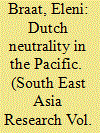

|
|
|
|
|
| Publication |
2011.
|
| Summary/Abstract |
The international disarmament debate of the 1920s provided an important opportunity for the Netherlands to raise the international profile of its colonial interests. This paper examines how Dutch participants in the disarmament debate combined the long-lived Dutch principle of neutrality with the different geopolitical situation of the Dutch East Indies. It shows that (1) Dutch delegates did not strictly interpret and apply the principle of neutrality to their colony in the Pacific. This seems contrary to (2) the Dutch perception that the position in Europe was almost identical to the situation in the Pacific. The little attention paid to these different interests in the Netherlands and the Dutch East Indies arguably developed from (3) a surprising naivety and provincialism concerning the geopolitical position of the Dutch East Indies. These three related conclusions illustrate the unfortunate composition of the delegations to the disarmament negotiations and the ignorance with which the Foreign Ministry intervened in colonial issues, arguably also indicating that Dutch colonial external relations and defence policy were ill-defined and not effectively adapted to the Pacific context.
|
|
|
|
|
|
|
|
|
|
|
|
|
|
|
|
| 11 |
ID:
145536
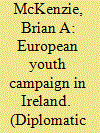

|
|
|
|
|
| Summary/Abstract |
The European Youth Campaign was a youth group covertly funded by the Central Intelligence Agency to promote European unification and security arrangements. It was created in response to the Soviet sponsored 1951 World Festival of Youth and Students held in Berlin. The Irish branch, which was active until 1958, offers a useful case study to examine the intersection of international Cold War politics and domestic concerns about youth deviance and the impact of American mass culture. Irish organizers hosted conferences and engaged in a broad publicity campaign. The European Youth Campaign also illustrates aspects of Americanization. Irish delegates stressed the contribution Ireland could make to the moral rearmament of Europe while at the same time debating the impact of productivity and materialism on Irish society. This study thus expands our understanding of Irish-European integration debates and shows how a small, neutral country participated in the cultural Cold War.
|
|
|
|
|
|
|
|
|
|
|
|
|
|
|
|
| 12 |
ID:
101470
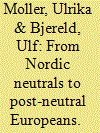

|
|
|
|
|
| Publication |
2010.
|
| Summary/Abstract |
This article analyses the foreign policy of two post-neutral EU member states, Sweden and Finland. Both these Nordic states have adjusted their past policies of neutrality in favour of extended participation in the European and transatlantic security community. Yet within a similar and comparable pattern of change, there are two very significant differences between them: their views towards future membership in NATO and their choice of military strategy. The article utilizes an analytical framework that treats neutrality as an institutionalized idea containing causal and principled beliefs. The persistence of neutrality as a guiding principle of policy depends on feedback regarding: (1) its strategic usefulness (implications for security) as well as (2) its social appropriateness (implications for identity). The feedback mechanisms are related in the sense that the self-interested element of military non-alignment for the sake of security needs to be compensated by an appropriate role, such as demonstrating responsibility and engagement in international issues. Having taken a more autonomous decision, although with a historical record of shortcomings as regards declared neutrality, Sweden has been more dependent than Finland in ensuring that its respective policy of neutrality is complemented by an appropriate international role. This was possible during the Cold War, yet became increasingly difficult after the collapse of the bipolar world order. Thus, the analysis undertaken suggests, paradoxically, that in order to remain militarily non-aligned, Sweden has come to favour a more European outlook at the expense of the integrity of its policy of neutrality.
|
|
|
|
|
|
|
|
|
|
|
|
|
|
|
|
| 13 |
ID:
091009
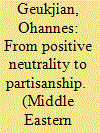

|
|
|
|
|
| Publication |
2009.
|
| Summary/Abstract |
This article examines the policy of the Armenian political parties in Lebanon in light of the Taif agreement in 1989 that ended the Lebanese civil war and granted the Armenian community more political rights. The Armenian parties (Dashnak, Hunchak and Ramgavar) in the post-Taif period were obliged to abandon the policy of positive neutrality that they adopted from 1975 to 1989, and took sides with various Lebanese parties to protect the communal interests that the consociational structure of the state had allowed them. However, the Armenian parties were not united over the goal of maintaining the Armenian bloc inside parliament. As they chose different policies to pursue communal interests they took sides with the ruling majority and the anti-government opposition. The Armenians were criticized by some Christian politicians for their partisanship and were expected to maintain their traditional neutrality in Lebanese politics. It is very likely that the Armenians will return to their neutral policy and support the President and the government once their group rights are protected.
|
|
|
|
|
|
|
|
|
|
|
|
|
|
|
|
| 14 |
ID:
179328
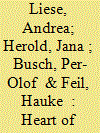

|
|
|
|
|
| Summary/Abstract |
Expert authority is regarded as the heart of international bureaucracies’ power. To measure whether international bureaucracies’ expert authority is indeed recognised and deferred to, we draw on novel data from a survey of a key audience: officials in the policy units of national ministries in 121 countries. Respondents were asked to what extent they recognised the expert authority of nine international bureaucracies in various thematic areas of agricultural and financial policy. The results show wide variance. To explain this variation, we test well-established assumptions on the sources of de facto expert authority. Specifically, we look at ministry officials’ perceptions of these sources and, thus, focus on a less-studied aspect of the authority relationship. We examine the role of international bureaucracies’ perceived impartiality, objectivity, global impact, and the role of knowledge asymmetries. Contrary to common assumptions, we find that de facto expert authority does not rest on impartiality perceptions, and that perceived objectivity plays the smallest role of all factors considered. We find some indications that knowledge asymmetries are associated with more expert authority. Still, and robust to various alternative specifications, the perception that international bureaucracies are effectively addressing global challenges is the most important factor.
|
|
|
|
|
|
|
|
|
|
|
|
|
|
|
|
| 15 |
ID:
090027
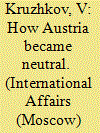

|
|
|
|
|
| Publication |
2008.
|
| Summary/Abstract |
In the process of the postwar settlement in Austria in the 1940s-1950s, the Western powers that occupied it (together with the Soviet Union) sought to draw the country into their military-political orbit. Needless to say, the USSR, which made a decisive contribution to freeing Austria from German Nazism and re-establishing its statehood, did not want the country to side with unfriendly forces again. As for the Austrians, spooked by the prospect of the "Sovietization" of the Alpine republic, they regarded the Western Occupying Powers as a guarantee of their sovereignty. However, when they realized that Austria was just "a bargaining chip" in a big geopolitical game, Austrian diplomacy became an independent player in the triangle of interests: the West - Austria - the USSR. As a result of intensive domestic political debate and hard-going negotiations with the parties concerned, the Austrians made a choice in favor of permanent neutrality. In the current debate on the issue of NATO enlargement, Austrian experience may prove to be highly relevant.
|
|
|
|
|
|
|
|
|
|
|
|
|
|
|
|
| 16 |
ID:
185049
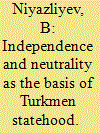

|
|
|
|
|
| Summary/Abstract |
ON SEPTEMBER 27, the Turkmen people celebrated the 30th anniversary of a landmark event in their recent history: the day Turkmenistan became an independent state. Turkmen President Gurbanguly Berdymukhamedov described the country's independence as the basis for the entire development of its statehood and the starting point of radical social, political, economic, and cultural reforms.
|
|
|
|
|
|
|
|
|
|
|
|
|
|
|
|
| 17 |
ID:
033266
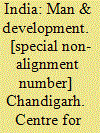

|
|
|
|
|
| Publication |
Chandigarh, Centre for research in rural and industrial development, 1981.
|
| Description |
173p.
|
|
|
|
|
|
|
|
|
|
|
|
Copies: C:1/I:0,R:0,Q:0
Circulation
| Accession# | Call# | Current Location | Status | Policy | Location |
| 019218 | 327.1713/CEN 019218 | Main | On Shelf | General | |
|
|
|
|
| 18 |
ID:
188453
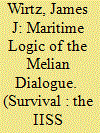

|
|
|
|
|
| Summary/Abstract |
There is a maritime logic embedded in Thucydides’ ‘Melian Dialogue’ that until now has attracted little notice; observers have instead concentrated on the deeper philosophical and moral issues highlighted by Thucydides in his tale drawn from the Peloponnesian War. Nevertheless, the maritime logic that propelled a confrontation on the island nation of Melos nearly 2,500 years ago could re-emerge in the run-up to a conflict in the Western Pacific. Allies are the strategic enabler of the US naval presence in the region, and US forces are taking steps to develop concepts and doctrine to enable operations in and along the First Island Chain. Denying access to these logistical facilities might be a political priority for China in the run-up to potential military action, and it would not be surprising if Beijing delivered a simple message to the inhabitants of the First Island Chain: stay out of it, and we will leave you out of it. All of this suggests that the idea of ‘neutrality’, as encountered in the Melian Dialogue, might again emerge during a crisis. Because the incentives to restrict US access to forward-operating bases are so clear-cut, strategists need to anticipate the emergence of ideas related to limiting the ability of US naval units to use port and air facilities in the Western Pacific.
|
|
|
|
|
|
|
|
|
|
|
|
|
|
|
|
| 19 |
ID:
040085
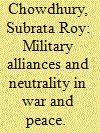

|
|
|
|
|
| Publication |
Bombay, Orient Longmans, 1966.
|
| Description |
xiv, 280p.
|
|
|
|
|
|
|
|
|
|
|
|
Copies: C:1/I:0,R:0,Q:0
Circulation
| Accession# | Call# | Current Location | Status | Policy | Location |
| 000040 | 327.116/CHO 000040 | Main | On Shelf | General | |
|
|
|
|
| 20 |
ID:
190042
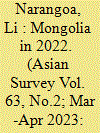

|
|
|
|
|
| Summary/Abstract |
As in 2020, the biggest stories in Mongolia in 2021 and 2022 were elections, COVID-19, and how to cope with the contracting economy. At the end of the year, Mongolia was struggling to meet public health challenges and to recover from the economic downturn. Both the government that was elected in 2020 and the president who took office in 2021 have promised to improve corruption, which is endemic in Mongolia, but people have yet to see much change. Popular dissatisfaction led to a huge public protest in December 2022 that demanded the government ensure more transparency in the coal trade. Thirty years after a peaceful transition to democracy, Mongolia is facing its greatest challenge: how to maintain and develop a transparent democracy that truly cares about public opinion and people’s livelihoods.
|
|
|
|
|
|
|
|
|
|
|
|
|
|
|
|
|
|
|
|
|